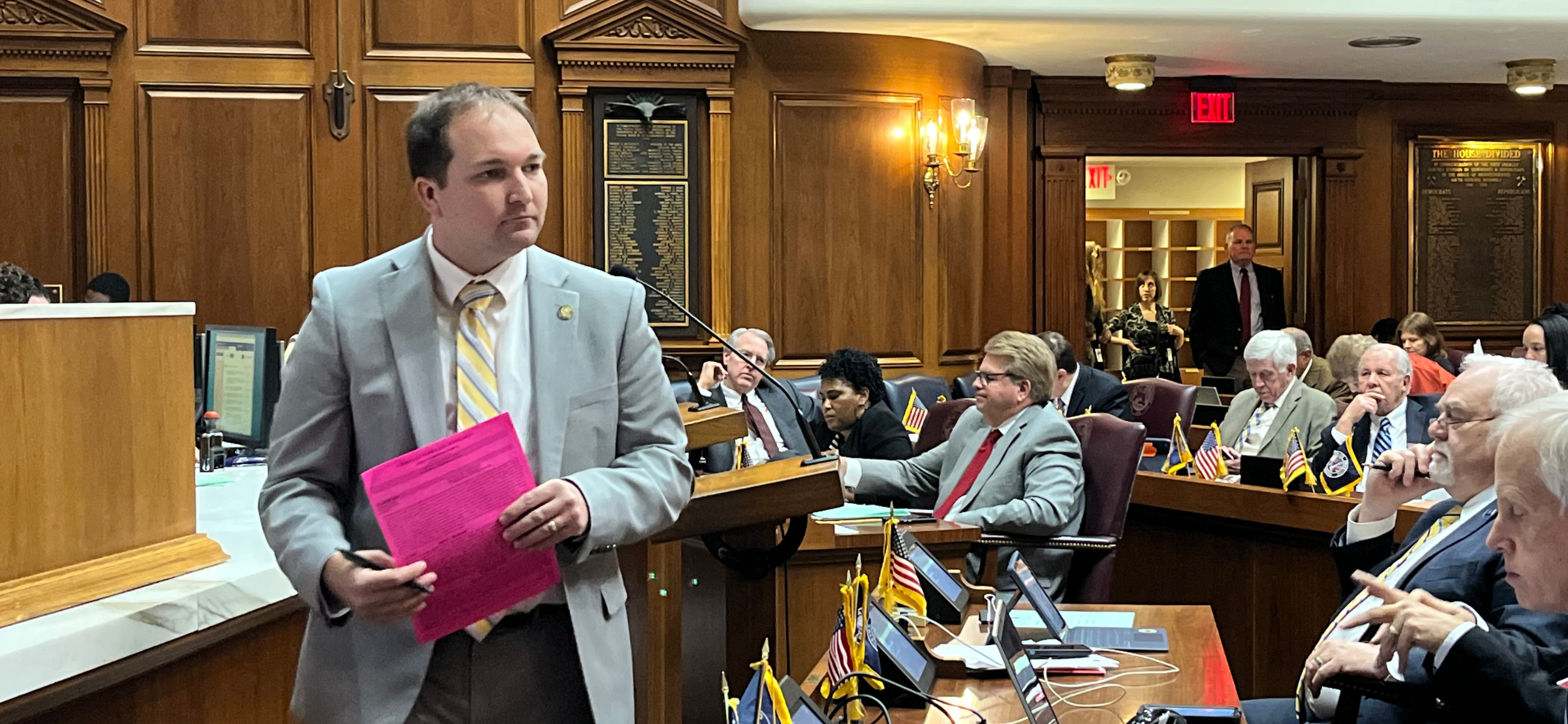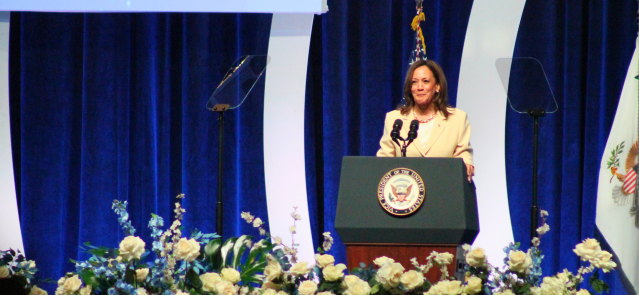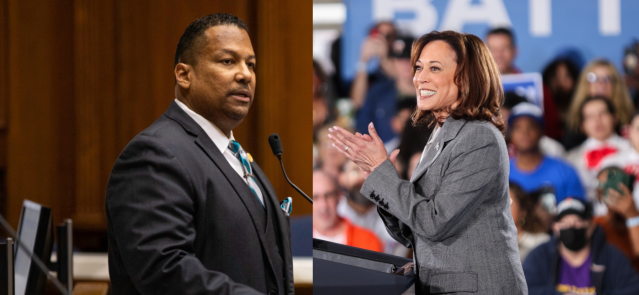Stay ahead of the curve as a political insider with deep policy analysis, daily briefings and policy-shaping tools.
Request a DemoRepublicans push through limits on public access counselor’s authority

Rep. J.D. Prescott, R-Union City, walks away from the podium after speaking in favor of a bill limiting the Indiana public access counselor's review authority on Wednesday, March 6, 2024. (Credit: Tom Davies)
Republicans gave final legislative approval Wednesday to a proposal placing strict limits on what Indiana’s public access counselor can consider in reviewing open government questions from the general public and others.
The House voted 58-36 in favor of House Bill 1338, to which the limits on the access counselor were added without any public notice by a Senate committee last week.
The leader of that committee said his disagreements with the access counselor included a review three years ago of a complaint submitted by a person who was blocked from the senator’s political campaign Twitter account.
Supporters of the access counselor’s office argue the limits in the bill would hamstring its ability to answer questions about possible violations of the state’s open meetings and public records laws.
House endorses limits with only Republican support
The bill would allow the access counselor’s advisory opinions to consider only “the public access laws, as plainly written,” and “valid opinions of Indiana courts.”
Bill author J.D. Prescott, R-Union City, defended the changes as “common sense” and maintained that the counselor could still weigh in on situations where the law isn’t clear.
Only Republican House members voted in favor of the bill, which now goes to Gov. Eric Holcomb for consideration. Six Republicans joined all Democratic House members in casting “no” votes.
The Senate endorsed the bill Tuesday, a day after Republicans rejected an effort by Democrats to remove the access counselor limitations.
Holcomb’s office declined to comment on the bill Wednesday.
The public access counselor’s office, with two attorneys and one other staff member, issues dozens of advisory opinions each year in response to questions from the public, government officials and others. It has no authority to enforce the access laws or punish violators.
The bill “functionally guts” the access counselor’s ability to consider the context of a situation unless it has been directly addressed by the Legislature or court, said Amelia McClure, executive director of the Hoosier State Press Association.
Rep. Ed DeLaney, D-Indianapolis, also objected to a provision eliminating the access counselor’s four-year term and making the position one that serves “at the pleasure of the governor.”
DeLaney argued that change will make the access counselor vulnerable to political pressure in reviewing complaints.
“We’re setting it up so that they can be fired if they don’t say exactly what we want,” DeLaney said. “It seems to me that this is a real step backwards for public access.”
The Legislature established the access counselor position in 1999 after a review by several newspapers found widespread violations of the public access laws by numerous local governments across the state.
Current access counselor Luke Britt was first appointed in 2013 by then-Gov. Mike Pence and reappointed by Gov. Eric Holcomb in 2017 and 2021.
Senator’s conflict with access counselor
Sen. Aaron Freeman, R-Indianapolis, last week expressed frustration with the access counselor’s advisory opinions when he first offered the amendment limiting the office.
Some conservatives criticized an opinion Britt released last fall in which he concluded the Hamilton East Public Library Board in Fishers violated the open meetings law when two board members met with their attorneys at a coffee shop.
That opinion came amid public debate over a push by conservative members of that board to review all youth-section books and move those with “inappropriate” content to adult sections.
Another action facing some conservative ire was an informal opinion Britt issued in December finding that the state Department of Health could stop releasing terminated pregnancy reports submitted by doctors following an abortion procedure.
Freeman told reporters Tuesday that one of his frustrations with the access counselor involved a complaint against him that Britt reviewed in 2021.
Freeman said his wife blocked from his campaign Twitter account a person who had posted a photo of their home and address in encouraging people to protest against him there.
Britt found that Freeman didn’t violate the law because the Twitter account was a personal or political one not subject to the public records law. But Freeman said he spent money on an attorney submitting a response to Britt that should not have been necessary.
“The law is very clear that outside accounts don’t count,” Freeman said. “So I never should have had to answer the thing. He should have summarily dismissed it and I never should have had to respond; the forcing me to respond was just completely unnecessary.”
Tom Davies is a Statehouse reporter for State Affairs Pro Indiana. Reach him at [email protected] or on X at @TomDaviesIND.
X @StateAffairsIN
Facebook @stateaffairsin
Instagram @stateaffairsin
LinkedIn @stateaffairspro
4 things to know about Braun’s property tax proposal
Sen. Mike Braun, the Republican candidate for Indiana’s governor, released a plan for overhauling property taxes Friday morning that would impact millions of Hoosiers, Indiana schools and local governments. “Nothing is more important than ensuring Hoosiers can afford to live in their homes without being overburdened by rising property taxes driven by rapid inflation in …
Bureau of Motor Vehicles looks to add new rules to Indiana’s driving test
The Bureau of Motor Vehicles wants to amend Indiana’s driving skills test, putting “existing practice” into administrative rule. Indiana already fails drivers who speed, disobey traffic signals and don’t wear a seatbelt, among other violations. Yet the BMV is looking to make the state’s driving skills test more stringent. A proposed rule amendment looks to …
In Indianapolis, Harris says she’s fighting for America’s future
Vice President Kamala Harris, the presumptive Democratic presidential nominee, told a gathering of women of color in Indianapolis on Wednesday that she is fighting for America’s future. She contrasted her vision with another — one she said is “focused on the past.” “Across our nation, we are witnessing a full-on assault on hard-fought, hard-won freedoms …
Indiana Black Legislative Caucus endorses Harris, pledges future support
The Indiana Black Legislative Caucus unanimously voted Wednesday to endorse Vice President Kamala Harris’ presidential run and will look at ways to assist her candidacy, the caucus chair, state Rep. Earl Harris Jr., D-East Chicago, told State Affairs. The caucus is made up of 14 members of the Indiana General Assembly, all of whom are …




